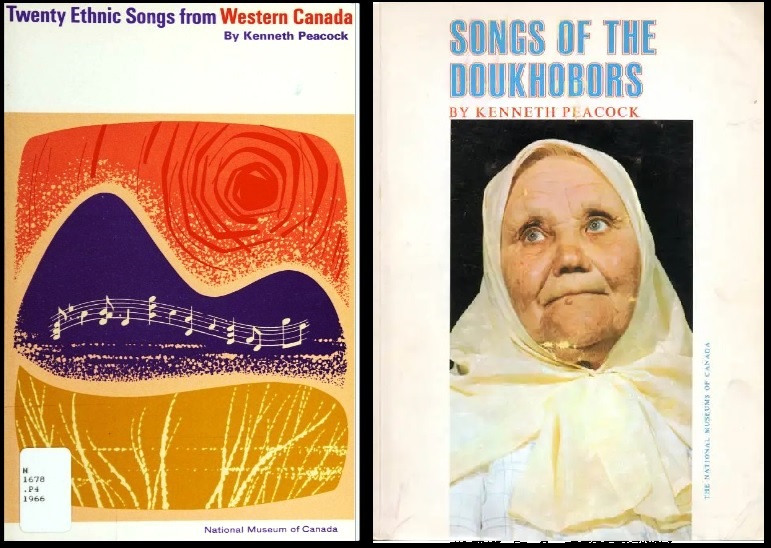Obituary of Kenneth Peacock
Born in Toronto in 1922. Died in Ottawa November 22, 2000
Updated by Andrei Conovaloff, with Dr. Anna Kearney Guigné — 24 May 2024.

After two years being bedridden with cancer
in an Ottawa Hospital, the outstanding Canadian musician
and composer died in his sleep from pneumonia. His most
recent honors came in 1998 when the Folklore
Studies Association of Canada awarded him the Marius
Barbeau Medal for his pioneering contributions to
folksong research across Canada which aided a folk music
revival and careers of young musicians. His collections
are archived in at least 14 repositories and have
regenerated a tradition perceived to be threatened.
Between 1951 and 1971, Peacock made 3,336
individual field recordings on 544 reels of tape for the
National Museum. His archives hold a wide range of
ethnographic documents based on his research: audio field
recordings, photographic and film images, short journal
articles, books, radio programs and two vinyl recordings.
In 1982 he was recognized with an Order of Canada : 'Mr. Kenneth H. Peacock: As a musicologist, he carried out pioneering research into the folk music of various ethnic groups in Canada, thus enriching our cultural awareness. Much of his material has been used by professional singers. He has published a number of collections, including Songs of the Doukhobors and Songs of Newfoundland Outports. [Outports are small coastal communities].'
———————————————————I had the pleasure of first meeting Ken in 1964 when he invited me to assist him with research contacts for recording Doukhobor music in Saskatchewan and Alberta. I got to know him well, and we were friends to his death. His legacy lives on.
Ken Peacock's formal musical training began at the age of five when his parents discovered him at the piano playing tunes he had heard on the phonograph. At the age of twelve he had a juvenile dance combo which played at local school dances and lodge banquets. But classical music was his main interest and he continued playing, composing, and teaching while attending university. At fifteen he graduated from the Conservatory in Toronto [In 1947 renamed The Royal Conservatory of Music] and four years later completed the Bachelor of Music course at the University of Toronto. He later studied philosophy, English and anthropology and continued his music studies in Boston and Montreal. His String Quartet #1 won a McGill Chamber Music Society Award in 1949.
In 1949 he met Marius Barbeau, Dean of Canadian folklorists, and worked with him on a number of projects including the transcription of First Nation music from old Edison cylinder recordings housed in the National Museum. Indigenous music and literature provided the basis of much of his composition during this period. His cantata Songs of the Cedar (click on 'Works'), based on West Coast native poetry, was among the compositions chosen to represent Canada for the Art Competitions at the 1952 Summer Olympics in Helsinki.
Working for the National Museum of Canada
from 1951 up to 1971, Kenneth Peacock's work took him from
one end of Canada to the other, often pioneering in areas
where folklorists had yet to venture. When Marius Barbeau
invited him to go to Newfoundland and begin to record the
folk music of the people there, Peacock told Dr. Barbeau:
'I don't know anything about recording.' To which Barbeau
replied: 'Neither do I. You can improvise as you go
along.' And Peacock did exactly that.
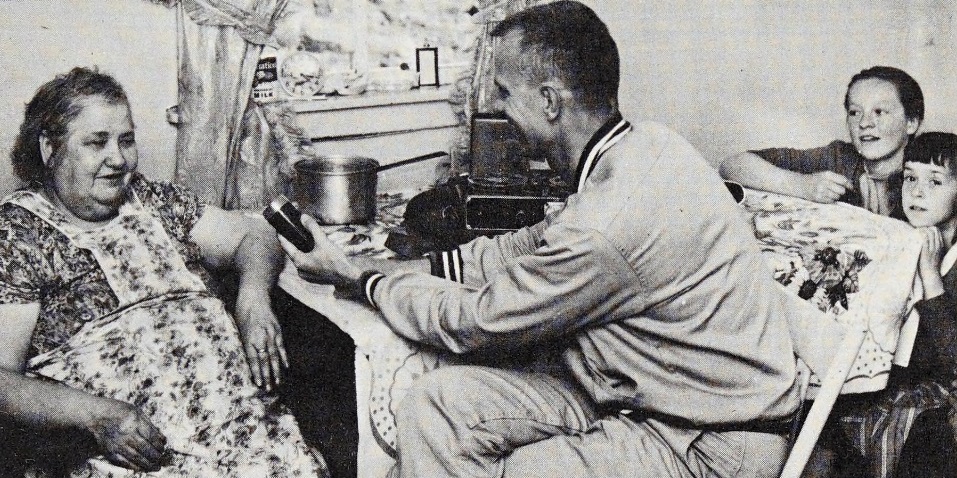
'Mrs. Wallace Kinslow, Isle Aux Morts, with Kenneth Peacock.'
Photo from Songs of the Newfoundland Outports (1965), Volume 2, page 409. (Get free account)
With tape recorder in hand and a music notation pad, his
work in Newfoundland (1951-1961) launched him as a
multicultural folk-song collector. He was largely
self-taught and not trained as an ethnomusicologist,
In between visits to Newfoundland, Barbeau
invited Peacock to collect music of Cree, Blackfoot,
and other natives of the Canadian Plains.
In 1953 and 1957, Peacock wrote and performed a series of radio lectures for the CBC about Newfoundland folk music.
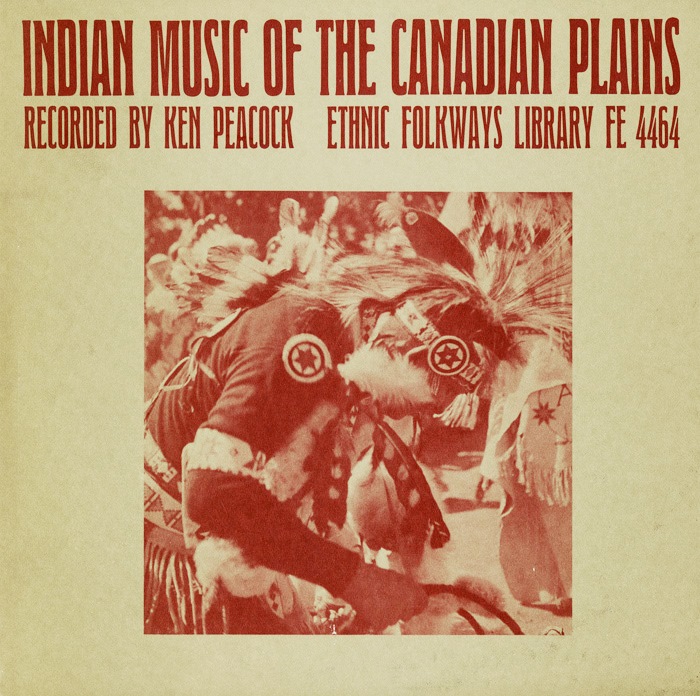 |
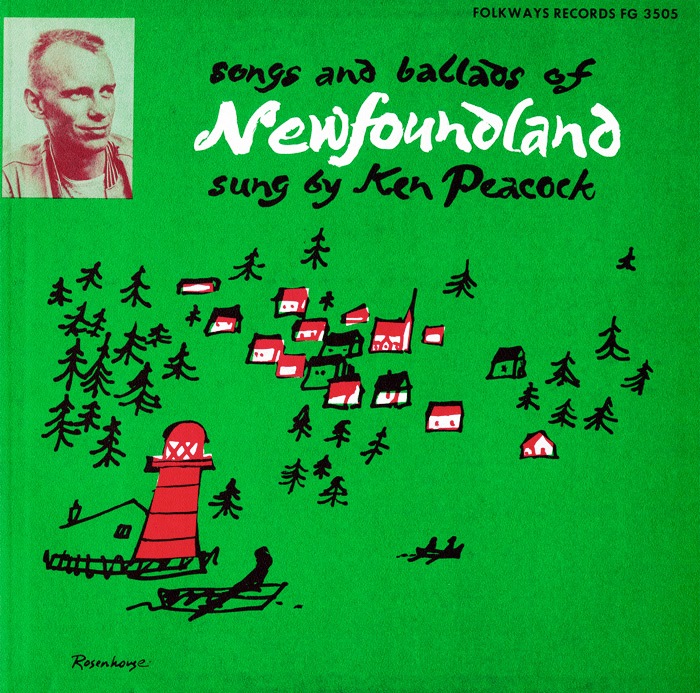 |
Some of these songs along with Newfoundland
material were released in the 1950s on two Folkways albums
(above): Indian
Music of the Canadian Plains (1955) and Songs
and Ballads of Newfoundland (1956), which Ken
performed himself based on rare material he had
transcribed by hand in remote areas where lack of
electricity prevented the use of a tape recorder.
After his first decade in 1963, he published a 13-page summary (A Survey of Ethnic Folkmusic Across Western Canada, Doukhobors pages 1-3) reporting that so far he met with 33 ethnic groups and recorded music from 18.
At the end of his Newfoundland research in
1961, a West German film company hired him to make a
one-hour documentary on the folk music of Newfoundland
which was later broadcast on European television.
Peacock was a member of the Canadian Folk
Music Society (CFMS), established in 1957 (today called
the Canadian Society for
Traditional Music). He was elected as a councillor
in 1959. The society’s creation was directly linked to
folklorist Marius Barbeau’s desire to host the
International Folk Music Council (IFMC) congress
in Canada in 1961. This led to the formation of the
CFMS. That organization received funds from the Canada
Council for the Arts to host the IFMC in 1961. (Massey
Commission,1951). Sir Ernest
MacMillan, a Canada Council founder, was a good
friend of Marius
Barbeau, a prominent Canadian musician who was
engaged to conduct the concert; and Barbeau
commissioned Peacock to create 'Essay
on Newfoundland Themes' for the 'Concert of
Symphonic Works Inspired by Canadian Folklore' in
Ottawa in 1961. (Guigné Folksongs
and Folk Revival 2008. p. 197).
In 1962 Peacock set out across Canada to see
if it would be feasible to study the folk music of immigrants
from Europe and Asia. In his 11,000 mile journey he
discovered a goldmine of material and spent the following
10 years crossing the country digging for traditional
music of almost 40 cultures. He also began photographing
and collecting the rich variety of musical instruments and
folk artifacts of these cultures. His pioneering efforts
formed the basis for the vastly expanded research and
display programs of the National Museums of Canada. To
help others to do what he was doing, he compiled his
advice into a 184-page book: A
Practical Guide for Folk Music Collectors (1966).
In 1963 he first visited USCC Doukhobor
and Sons of Freedom communities in British Columbia. He
was touched by the warmth, cooperation, deep faith, and
uniqueness of the singers and their voices. In 1964, with
my assistance, he continued recording with Independent
Doukhobors in Alberta and Saskatchewan. In those two
years he collected about 500 Doukhobor songs.
He published 5 Doukhobor songs notated with
musical analysis in Twenty
Ethnic Songs from Western Canada (1966),
National Museum of Canada. Ottawa, 91 pages (added to the
online Internet Archive in Feb. 2024); and then devoted a
full book: Songs of the Doukhobors: An
Introductory Outline (Bulletin 231,
Folklore Series No.7.1970 — 27 songs, Russian/ English,
167 pages, online at the Canadian Museum of History in 9
PDFs [Archived Dec 4, 2018]).
In Twenty Ethnic Songs (91 pages),
covering Doukhobor, Mennonite, Hungarian, Ukrainian and
Czeck, Ken devoted 42 of 91 pages (46%), including 12
photos and a complimentary 7-page introduction, explaining
USCC Doukhobors and their song traditions. As the first
musicologist who transcribed the motifs of Doukhobor
psalms into musical notes, he found that their traditional
oral literature and music goes back to many centuries and
continues to unite all Doukhobors today
with beauty, culture, and spirit. One of the psalms he
transcribed explains it best: 'The singing of psalms
beautifies our souls.'
The following is a chronological list
spanning 30 years of most of the other publications about
Doukhobor song by and about Peacock:
- 1966 Peacock — 'The Music of the Doukhobors.' Alphabet
10 (1966): pages 33-44.
- 1967 Peacock — 'Some Observations On Doukhobor Psalms
and Their Auditory Function,' an Unpublished paper
prepared for the annual meeting of the American Folklore
Society, Toronto, Ontario Canada, Nov. 17-19. Pea-E-2.
Kenneth Peacock Fonds, Canadian Museum of Civilization
(now Canadian Museum
of History), 1967.
- 1969 Tarasoff — A Pictorial History of Doukhobors (Free account, Internet Archive) — 14 of Ken's photos published.
- 1982 Tarasoff — Plakun Trava: The Doukhobors. pages 220, 268, 271 — Brief description of Peacock's findings, and 3 of his photos were published.
- 1970 Peacock — 'Chord Songs of the Doukhobors.' given
at the Faculty of Music, University of Toronto, 12 Nov.,
Canadian Museum of Civilization, PEA E-1 (H 306-5),
1970.
- 1983 Peacock — Contributed four sections: 'Doukhobors.'; 'Folk Music.'; 'Native North Americans in Canada. 3. Plains.' and 'Lithuania.' Encyclopedia of Music in Canada. Eds. Helmut Kallmann, Gilles Potvin and Kenneth Winters. Toronto: University of Toronto Press. 1981. 279-80; 336-37; 452 and 556.
- 1992 Perry — Perry, Shirley Mercedes (nee Cheveldayoff). 'Selected Psalms, Old Verses and Spiritual Songs of the Canadian Doukhobors: Transcription and musical analysis'. Ph.D. thesis, School of Music, University of Arizona, 1992, 267 pages. — Critique of Peacock's publications.
- 1995 Peacock — 'Culture and Continuity -- A Personal
Reminiscence of the Nineteen-Sixties', in Tarasoff,
Koozma and Klymasz, Robert Bogdan, eds., Spirit
Wrestlers : Centennial Papers in Honour of Canada's
Doukhobor Heritage, Mercury Series,
Vol. 67, Hull, Quebec : Canadian Centre for Folk
Studies, Canadian Museum of Civilization, 1995, pp.
33-38. (Internet Archive). — History and description of
singing style. On page
35, he interprets the imagery of several hymns and
songs as being similar to Sibylline
oracles.
- 2002 Tarasoff — 'The Remarkable Kenneth Peacock',
Spirit-Wrestlers:
Doukhobor Pioneers' Strategies for Living, (Legas:
Ottawa), pages 214-216 — More on pages:
xii, 88, 109, 128, 366, 370, 410, 430; photos 214-215,
430.
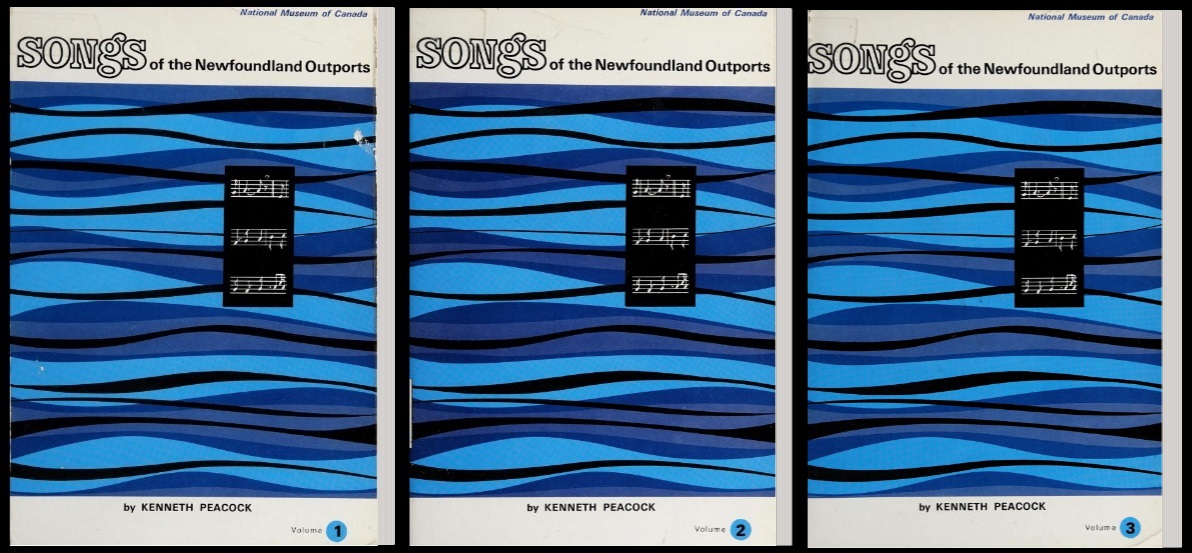
Between 1951 and 1961, during 6 field visits to Newfoundland,
Peacock visited 118 people in 38 communities, and acquired
766 folksongs (638 on tape, plus 128 by hand notation when
he did not have electricity).
In 1965, 71% of this Newfoundland material,
546 songs under 411 titles, was published by the Canadian
Museum of History in a monumental three-volume collection
totaling 1035 pages, titled Songs
of the Newfoundland Outports (SNO, Volumes
1-3,1965) (above). He documented British, French, Irish,
Newfoundland and Gaelic songs, capturing and era when many
people were still singing widely as the distraction of
radio, jukeboxes,
records, tapes, and television was beginning to affect
their cultures.
Even today, SNO is still the largest published collection of Canadian folksongs and continues to be a key reference for both folksong scholars and musicians. A sample of 12 songs from SNO are online on the YouTube channel of the Canadian Museum of History.
Shortly following the publication of SNO
in 1965, news of his work in this remote area inspired
folk music scholars as well as folk revivalists to follow
in his tracks. As Peacock had included the names and
communities where he found his songs, many local musicians
and singers were able seek out, learn and preserve their
heritage and stimulate a traditional folk-music revival in
Newfoundland. Some created their own blend of rock music
with traditional folk music, called 'trad-rock'. His work
influenced many local musicians, among them the popular
Newfoundland trad-rock band Figgy
Duff.
Decades later SNO became rare and
expensive, so the Newfoundland-based recording company SingSong
produced a CD-ROM using SNO material with 500+
songs from nearly 100 informants, and 40+ photographs. In
2006 this 'long-awaited CD-ROM version' was extensively
reviewed with instructions about how to use it, by David
Gregory, Athabasca University, in 'Kenneth
Peacock's Songs of the Newfoundland Outports',
21 pages.
In 2019 the entire 3-volume SNO was
posted online by the Trent University Library, Ontario,
for anyone to read for no cost on the Internet
Archive. You need a free account to borrow
these 3 book for 1-hour increments, and access over
70 million other items, most in the public domain. (Search
for 'Doukhobor' and find nearly 400 items.)
Several Canadian musicians used selections
from SNO for their products:
- 1968 — Five Songs from the Newfoundland Outports, by Harry Sommers.
- 1970 — Six Maritime Folksongs, by Keith Bissell, 12 songs, 2 volumes, 32 pages.
- 1986 —Twelve Songs of Newfoundland. by D.F. Cook, Waterloo, ON
Another project, A
Garland of Rue: Lithuanian Folksongs of Love and
Betrothal (1971) edited by Ken, is a collection of
Lithuanian matchmaking songs about 'the sad state of
marriage.' For Peacock the songs were particularly
interesting because the Lithuanian people were
Christianized only in the 13th century; many of their
songs still contained powerful references to pre-Christian
beliefs when trees, stones, the sun and the moon were gods
and goddesses. He was fascinated with mystical folk
culture.
The Canada Music Week newsletter (Nov. 19-26, 1989) made this assessment of Kenneth Peacock: 'Several Canadian composers, including Harry Somers, John Beckwith and Keith Bissell, have made various types of concert settings of his folksongs, sometimes with specific artists in mind such as Maureen Forrester or the Festival Singers [of Canada]. And on a more popular level, professional folksingers have been using his material on recordings, radio and television for over 35 years. It has been said that his pioneering research and publications on so many cultures has contributed much to the current interest in multiculturalism in Canada.'
Kenneth Peacock was an avid reader who enjoyed the company of intellectual and creative peoples. He and composer Harry Somers were students of John Weinzweig. Although he did not personally know Glenn Gould, the two probably passed each other in the music conservatory's halls at the University of Toronto. Peacock recalls being in Marshall McLuhen's home in Toronto around 1953 when several professors were deeply engrossed arguing the merits of Mechanical Bride: Folklore of Industrial Man (1951). As he was leaving, McLuhen, the master of 'the medium is the message', said: 'Do you know that there is a new toilet paper for executives? It is green in color and smells sweet with chlorophyll. Why? "For kissing sweet".'
During his teens, Peacock recalls when the famous Northrop Frye invited him and other students for classes in his home. 'He was a very kind person,' Ken told me, 'but people were afraid of him. He was intelligent and precocious. When dealing with literary criticisms at the table, he often quoted lengthy paragraphs by memory.'
Along with colleagues Marius Barbeau (1883-1969), Helen Creighton (1899-1989) and Edith Fowke (1913-1996), he is considered a pioneer in terms of his efforts to research and disseminate music in Canada, and was influential in the Canadian folk revival movement. His musical talents were greatly appreciated by Helen Creighton who employed him to do most of the transcriptions of her Nova Scotia collection. He also provided musical transcriptions for Robert Klymasz for some of his Ukrainian publications. His work was readily used by such professional folk song interpreters as Tom Kines (1922-1994) and Alan Mills (1913-1977). Alan Mills autographed a copy of his book Favorite French Folk Songs (1965) 'To Ken who knows so much more about our songs, then I do, and whose kindness in sharing his knowledge with others is deeply appreciated.'
Although he was not interested in organized
religion, Peacock was always interested in spiritual
matters, the search of the inner and outer spaces, and Chinese Tao.
As time permitted in the 1980s, he went on retreats with a
Tibetan Buddhist on top of a mountain near Lincoln,
Vermont, USA.
In his 1995 article 'Culture and Continuity
...' (listed above) on page
35, he interpreted the imagery of several Doukhobor
hymns and songs as being similar to Sibylline
oracles '... often apocalyptic, warning of the dire
consequences if the "true path" was not followed. ... The
commune envisage ... is not unlike ... imagery ...
reflected in several psalms and hymns sung by the
Doukhobors in 1963 ... One is reminded here of the famous
prophecies ... of the woman leader Lukeria Kalmykova ...
many other parallels exist in Doukhobor texts ... to rival
the fervor of many millenarianist
prophets of out own time. ... '
His search for simplicity, sincerity, depth
of meaning, and beauty were revealed here as they were in
his photographic interests which he developed from his
youth and later used in his fieldwork.
For many years he made his own horoscopes and often threw I Chings using coins for himself and friends. He once threw one for me to determine whether I should choose to go to Smith Falls Community Hospital (closed 1995) or The Ottawa Hospital for an operation on a ripped Achilles tendon. The choice was Smith Falls and the operation was successful.
His personal library was rich with
spiritual, occult, and paranormal information, including
such authors as Edgar
Cayce, Carlos
Castaneta, G.I.
Gurdieff, Jane
Roberts, Bertrand
Russel, George
Bernard Shaw, Plato, Aldus
Huxley, Henry
David Thoreau, Noam
Chomsky, Robertson
Davies, Northrop
Frye, and many others. Many of these volumes have
since been donated to local hospitals. He was friends with
singer k.d.
lang.
By the end of his folklore collecting career
Peacock had made over 3,300 recordings on 560 tapes. His
correspondence, essays, and visual and auditory materials
of 2,500 songs from the field collections of 552 tape
recordings recently formed the Kenneth
Peacock fonds (F 669) at the Provincial Archives
Saskatchewan, Regina; and the Kenneth
Peacock Fonds, Memorial University of Newfoundland
and Labrador Folklore and Language Archive (MUNFLA), with
144 audio reels (1951-1961). Earlier his full photographic
and audio collection was catalogued and is housed
at the Canadian Museum of Civilization [2013: Canadian
Museum of History] in Hull [now in Gatineau],
Quebec. He willed most of his estate to the Faculty
of Music, University of Toronto which funds the
'Kenneth H. Peacock Lecture Series', and to the Main
Branch of the Ottawa YMCA-YWCA [National Capital Region].
The legacy of this talented musician, composer, and
folklorist lives on.
Imagine
Perfect Resonance. A chord is struck, but never fades,
sustained forever
Kenneth Peacock was a distinguished alumnus of the
University of Toronto's Faculty of Music. His body of
work, as a composer and researcher for half a century, has
made a significant impact on musical life in Canada. The
Faculty of Music was very grateful to learn that Mr.
Peacock had made a bequest to the University of Toronto in
his will for the benefit of our music programs. With this
legacy gift, the Faculty of Music will establish the
Kenneth H. Peacock Lecture Series in Music in keeping with
his lifelong interest in and contribution to the
multi-dimensional study of music. Thank you Mr. Peacock. —
(Brochure: 'A
World of Song: The MacMillan Singers', University of
Toronto, Faculty of Music, October 27, 2001.)
An only child, his mother Goldie died in
1975 and father Aubrey in 1978.
Revival
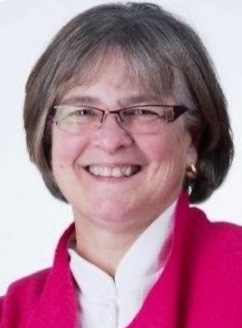 Before Ken died in 2000, a graduate student
of folklore, Anna
Kearney Guigné (right) in Newfoundland, began a
16-year project in 1994 to review and to scrutinize the
impact of his research both in
Before Ken died in 2000, a graduate student
of folklore, Anna
Kearney Guigné (right) in Newfoundland, began a
16-year project in 1994 to review and to scrutinize the
impact of his research both inNewfoundland and Canada.
Anna Guigné was born in Central Newfoundland, but grew up mainly in St. John’s.
In 1970 she first learned of SNO while performing in St. John's as solo folksinger with guitar. She was informed by an American student doing graduate studies in Folklore at Memorial University. She soon began performing songs from her own copy of SNO.
In 1994, while undertaking graduate studies she discovered that her school, Memorial University, contained Peacock’s Newfoundland field recordings in its Folklore and Language Archive (MUNFLA).
In 1994, she contacted Peacock and asked if he would be willing to talk about his Newfoundland fieldwork and the making of Songs of the Newfoundland Outports. Peacock kindly agreed and, between 1994 and 2000, she carried out twenty-nine interviews with him. As Guigné lived in Newfoundland and Peacock lived in Ottawa, they conducted many of these discussions over the phone. Additionally, they regularly corresponded by letter. During this time Peacock frequently sent her information on his life and career. She visited him in Ottawa in 1996 and 1997 conducting additional face to face interviews. Her last correspondence with Peacock was 3 Feb. 2000 and she briefly visited him during the summer of 2000, a few months before he passed away. Peacock was always generous with his time and during these sessions he provided details on his family life, his early career as a musician, his interests in Indigenous and Ethnic music, his extensive career with the National Museum of Canada as well as his Newfoundland folksong research. Using his notes and her own genealogical searches, Guigné was able to find many of the people who Peacock recorded between 1951 and 1961. She documented her extensive project in her Ph.D. thesis (2004) 'Kenneth Peacock’s Songs of the Newfoundland Outports: the Cultural Politics of a Newfoundland Song Collection', and later a book Folksongs and Folk Revival: The Cultural Politics of Kenneth Peacock’s Songs of the Newfoundland Outports (2008) [Outports].
Most of this research was accomplished during the 6-year period before he died. During this time she tediously compiled a detailed list of his published and unpublished Newfoundland field recordings. She additionally examined his entire body of work. She focused on his Newfoundland fieldwork, because it launched his lasting impact as a folk music specialist, and revived local folk song among the younger Newfoundlanders, like herself. In 1997 and 1998, Anna visited Peacock in Ottawa. During this second meeting she presented him with the prestigious Marius Barbeau Medal which he had been awarded that year by the Canadian Folklore Studies Association of Canada. By this time, Peacock had become quite frail. When she visited him again in 2000, Peacock was in a long-term care facility.
Since I (Tarasoff) lived in Ottawa, worked with and knew Ken, Anna would email questions to me to ask Ken in the hospital, and email back. I learned a lot about Ken during those visits. In 2000, with the help of some friends, I moved his collection to the Saskatchewan Archives Board (SAB), and sent her a 'Preliminary List' of the contents of his collection with more of what I knew about Ken. The Archives also granted her access to his material (Guigné thesis 2008, 12).
In 2000 she wrote in his obituary that, as a collector Kenneth left a lasting impression on those who he recorded in the field. Those of his Newfoundland informants whom I subsequently interviewed spoke with warmth and affection regarding his work and interest in their lives, and showed me copies of Songs of the Newfoundland Outports which they had received with his personal note of thanks. These books showed the wear and tear of constant circulation. ... High value is placed on these books from within the community. Newfoundland is not the exception. This kind of impact has registered among many of the other cultures Kenneth documented across the country. ... Along with his peers ... Kenneth Peacock's research was undoubtedly shaped in part by overtones of romanticism and survivalism, threaded with an intense feeling of Canadian nationalism. Like many of his colleagues the was also influenced by the American and British folk revival movements.
As his career unfolded at the Museum he helped give shape to the Canadian folk revival movement. In this sense his activities like many of his peers were frequently the result of a desire to introduce Canadians to the wealth of music in their own country. Kenneth Peacock consequently influenced the direction of folkmusic scholarship leaving his own personal mark upon the discipline. Much to his credit, he ensured that a considerable amount of the music he had recorded ended up being published or used by others. Through his survey work from coast to coast and through his many publications he helped Canadians of many nationalities and origins to discover their musical roots. As a lasting legacy he has brought us all much closer to understanding both the cultural diversity.
In her doctoral thesis published 4 years after Ken died, Anna explained her objective: '...outlining to persons who have misunderstood Peacock's research [and] what he was trying to accomplish. ... to better understanding his motivations for creating SNO and his treatment of the materials he collected. ... It later reshaped Newfoundlanders' views of the extent of their own musical traditions and contributed to the Newfoundland-centered folk revival. ... '
In 2008, Professor Anna Guigné compiled a history of Ken and his work, published as: Folksongs and Folk Revival: The Cultural Politics of Kenneth Peacock's Songs of the Newfoundland Outports [Outports] (cover below). The description says: 'New knowledge regarding Peacock's life and times facilitates our understanding of this man's immense contribution to both Newfoundland and Canadian folklore scholarship while at the same time allowing researchers to make greater use of the materials he so diligently collected.'
Reviewer Natalie Kononenko summarized: 'What Guigné concludes is that Peacock was a man of his time. He valued songs that seemed the most ancient, the ones most like the songs brought to Canada from England, something that is just not done today. Furthermore, he gave little performance context. He did not describe when and where the songs he recorded were normally performed. When publishing the material he collected, he sometimes blended several recordings together to produce a more perfect piece, another practice that goes against current norms. Not surprisingly, what Peacock did was in keeping with the norms of his day.' (Kononenko, pages 245-246)
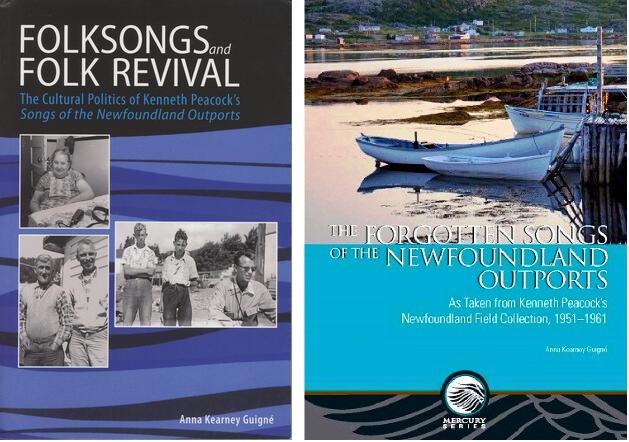
In 2016, Dr. Guigné published a supplement to SNO titled: The Forgotten Songs of the Newfoundland Outports. It includes 127 songs taken from Peacock’s extensive archival collection at the Canadian Museum of History, which he had excluded from the original three-volume collection. This publication also includes extensive notes on the songs and brief biographies of 58 of the singers who provided this material. This new publication is far-ranging and eclectic. It includes music hall and vaudeville material along with country and western songs.
Forgotten Songs was launched November 30, 2016, in the MMaP Gallery, Memorial University of Newfoundland. An hour video (56 min.) of the event is online with extensive discussion of his work by the author and three professors. Anna is well introduced at minute 35:50 and describes this project she started in 2010, going back to Peacock's arrival in Newfoundland in 1951. (Reference 15 below)
For more than two decades after his death, Peacock's work has been publicly discussed:
- 2018 — the latest review of Forgotten Songs was published by Sparling, nearly 2 decades after Peacock died. (Reference 14 below)
- 2020 — Dr. Guigné launched her project Doughboys and Molasses, Oh!: Traditional Songs from the Gros Morne Region, video, (51 min) — She introduces Peacock at min. 16:50. (Reference 16 below)
- 2021 — Anna was interviewed on local St. John's radio to promote her new project-album — Doughboys and Molasses Oh!'. She extensively spoke about Peacock. (Reference 17 below)
- 2024 — a sample of 12 songs from SNO are online on the YouTube channel of the Canadian Museum of History.
References
- Saugeres, Lise (1991) Figgy
Duff and Newfoundland culture. Masters thesis,
Memorial University of Newfoundland. — Figgy
Duff, Wikipedia. — Impact by Kenneth Peacock on
'trad-rock' is described on pages 94 and 135, with
examples on at least other 30 pages.
- Peacock, Kenneth. (1995) A
Guide to the Doukhobor Archives. Canadian Museum
of Civilization, 1995, 1997 — a compilation of
unpublished records about the Doukhobors held in the
Canadian Museum of Civilization’s archives. 11 items by
Peacock.
- Guigné, Anna K. (2003). Kenneth
Howard Peacock: 1922-2000 (PDF). Obituary in Ethnologies,
Volume 22, Number 2, 2000, p. 289–294 — Reposted
(HTML) in The Free Library, 2014.
- In
Memoriam: Kenneth Howard Peacock, Composer and
Folkmusic Specialist 1922-2000, The Canadian
Folk Music Bulletin, Volume 35.1, May 2001,
pages 22-25. — Dissertation on 'Negro Folk Music'
(1943).
- Tarasoff, Koozma J. (2001) 'Kenneth
Peacock: Outstanding Canadian Musician, Musicologist
and Folklorist (archived), Iskra [Grand
Forks, B.C.] No. 1902: Pages 15-17. — The above is an
enhanced version, with images and links.
- Tarasoff, Koozma J. (2002) 'The
Remarkable Kenneth Peacock', Spirit-Wrestlers:
Doukhobor Pioneers' Strategies for Living,
(Legas: Ottawa), pages 214-216 — More on pages:
xii, 88, 109, 128, 366, 370, 410, 430; photos 214-215,
430. The
original obituary was excerpted from this section.
- Guigné, A. K. (2003). The
Songs That Nearly Got Away: An Examination of the
Unpublished Portion of Kenneth Peacock’s Newfoundland
Field Collection. MUSICultures 30:
47-63. — When published it was named the Canadian
Journal for Traditional Music.
- Guigné, Anna Kearney. (2004) 'Kenneth
Peacock's Songs of the Newfoundland Outports: The
Cultural Politics of a Newfoundland Song Collection',
Ph. D. thesis, Department of Folklore, Memorial
University of Newfoundland, Canada, 10 May 2004. PDF 864
pages. — A critical review (pages 11-14) and
'study of Peacock's life and work' to fill in 'large
gaps' ... to ... 'provide new information about the
nature of folksong research in Canada in the 1950s and
'60s and its link to the Canadian folk revival movement.
(pages 6-7)
- Kenneth
(Howard) Peacock. Ethnomusicologist, composer, pianist,
by Denise Ménard and Betty Nygaard King, The
Encyclopedia of Music in Canada, 2007.
- Anna Kearney Guigné. (2008) Folksongs
and Folk Revival: The Cultural Politics of Kenneth
Peacock's Songs of the Newfoundland Outports,
ISER, Institute of Social and Economic Research #71,
Memorial University Press, April 2008, 331 pages
(Google
Book) — Interviews and biography.
—— Review by Mark Finch, Memorial University of Newfoundland, Ethnologies, 31(2), pages 338–341.
—— Review by Doreen Klassen (PDF), Sir Wilfred Grenfell College, Memorial University of Newfoundland, Newfoundland & Labrador Studies, Vol. 24 No. 2 (2009), pages 281-283.
—— Review by Natalie Kononenko (PDF), Canadian Ethnic Studies, Canadian Ethnic Studies Association, Volume 41, Number 1–2, 2009, pages 245-247.
- Kenneth
Peacock, Canadian Music Centre, Music Library —
Links to: Works, Centrestreams, Products.
- Kenneth
Peacock, Wikipedia (English), 2011.
- Kenneth
Peacock, Wikipedia (German), 2015.
- Guigné, Anna. (2016) The
Forgotten Songs of the Newfoundland Outports: As
Taken from Kenneth Peacock’s Newfoundland Field
Collection, 1951–1961, Mercury Series,
Cultural Studies Paper 87, November 2016, 460 pages, 17
illustrations, ISBN 978-0-7766-2384-9
—— 12 songs remain online from 27 posted on the Canadian Museum of History, YouTube channel, November 24, 2016.
—— Book launch (video 56 min. with advertising) November 30, 2016.
—— Book Review by Peter G. Toner, The Acadiensis Blog, May 19, 2017.
—— Book Review by Heather Sparling, Cape Breton University, Newfoundland & Labrador Studies, Vol. 33 No. 1, 2018.
- Kearney Guigné, Anna. Hiscock, Philip. Willis, John.
O'Bryne, Fergus. (2016) 'Forgotten
Songs of Newfoundland Outports Book Launch.' Video
recorded November 30, 2016, at the Research Centre for
the Study of Music, Media, and Place at Memorial
University of Newfoundland in St. John’s, Newfoundland,
Canada. MMaP Special Event, 56:35 min.
- MMaP
Special Event - Virtual Album Launch of Doughboys and
Molasses, Oh!: Traditional Songs from the Gros Morne
Region, video, (51 min), Nov 26, 2020 —
Dr. Anna Kearney Guigné begins her presentation (minute
10:04), and introduces Peacock (min.
16:50) who recorded a 'singing network' and others
who documented the folk music in Newfoundland. She ends
at min. 31:06. Credits of 4 speakers and 6 singers and
songs listed at min.
49:37.
- 'Anna
Kearney Guigné on the new project, Doughboys and
Molasses Oh!', Celtic Wake Up with Zach
Snow, (audio podcast, 35 min.), SoundCloud,
December 2021. — Broadcast on St. John radio CHMR-FM.
The first 10 minutes summarize meeting Peacock and
starting her project. Then 7 minutes of an overview of
folk music research in Newfoundland, including Peacock,
and several mentions to minute 30.
Photo credits: (Left
to right) (1) Appendix 5 : Plate 1, Photos of Kenneth
Peacock (Caption: Kenneth Peacock, age 5 [1927]),
Anna Kearney Guigné, 'Kenneth
Peacock's Songs of the Newfoundland Outports: ...,
Ph.D. thesis, 2004. PDF, page 845; (2) Taken for the 1956
Folkways album Songs and Ballads of Newfoundland, in
Koozma J. Tarasoff collection, c. 1964; (3) K.J. Tarasoff
collection, c. 1979, from a newspaper clipping; (4)
'Photographer unknown, Ralph Schlüter Archive (cropped)',
Kenneth
Peacock, Biographical information, Olympedia.
